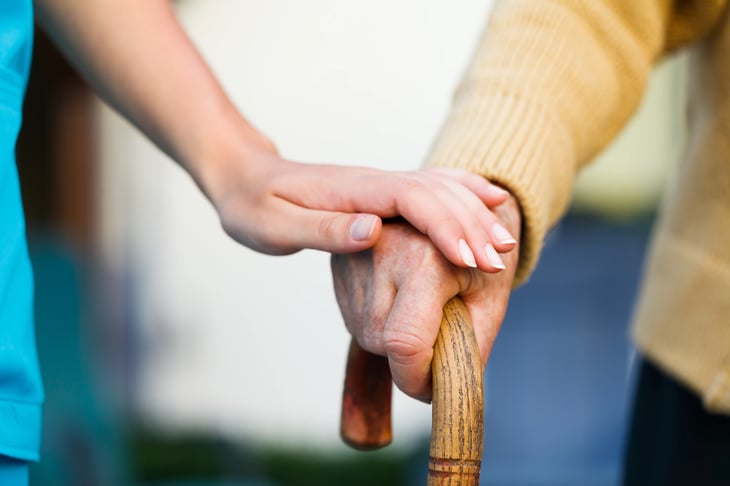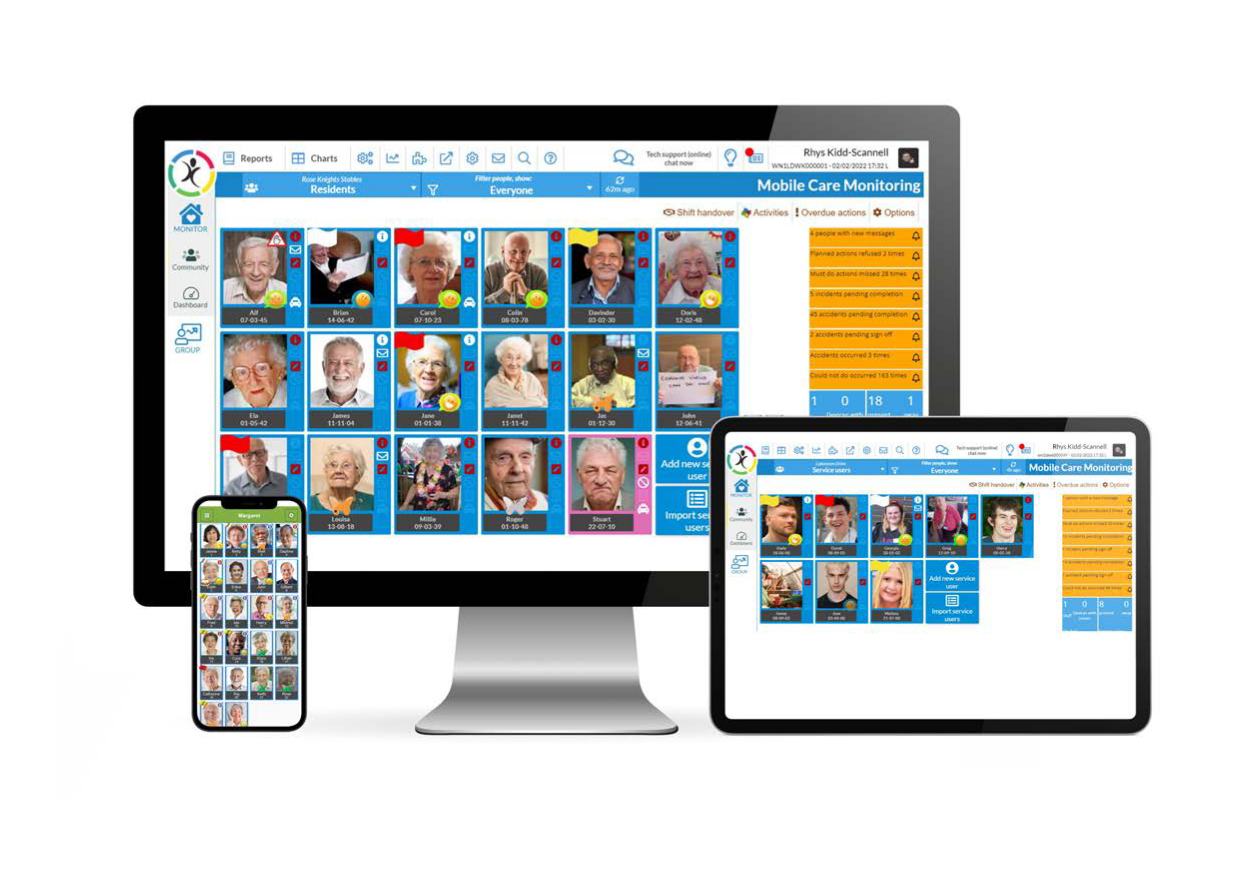What do adult social care providers need to know about HIV?

What is HIV?
HIV (human immunodeficiency virus) is a virus that damages the immune system's cells and weakens the ability to fight everyday infections and diseases.
HIV in the UK: statistics
When HIV was first discovered, there was no effective treatment, and many people died from AIDS-related diseases before they reached older age. In the mid-1990s, there was a significant breakthrough in the discovery of effective medication, which brought about considerable change. So now, if an individual is diagnosed on time and receives treatment, they can expect a normal life expectancy - this, coupled with the fact that a growing number of people are getting HIV in older age, means that it is more likely that adult social care providers will be providing more HIV care in the near future.
As people can live longer, healthier lives with HIV, we have seen the number of people with an HIV diagnosis who are aged 50 and over increase in recent years.
According to the National Aids Trust, the UK's leading charity dedicated to transforming society's response to HIV:
- Almost half (49.8%) of people accessing HIV care in 2022 were aged 50 or over, and 8.9% were 65 or over.
- Over time, the number of people living with HIV aged 50-64 has increased, and this group is now bigger than the 35-49 years age group - this shows how effective treatment is helping people to live longer with HIV.
With more adults now living into older age with HIV, care teams working in the social sector should be educated and mindful of how they can best ensure their services are 'HIV ready' to enable them to provide equitable, high-quality services to everyone.
What do carers need to do differently for residents living with HIV?
The answer to this is very little, but it's important to note that everyone is different, so when providing care to anyone, it's crucial to consider each person's needs. In terms of essential everyday care, there is no need to treat someone living with HIV any differently than any other resident. This is because there is no risk of HIV transmission from the day-to-day activities that occur during residential or domiciliary care.
For example:
- If it isn't general practice for everyone, people living with HIV should not be given separate or disposable cutlery or bedding, nor should things they use be labelled as there is no risk of HIV transmission from contact with everyday possessions.
- When moving, washing, changing dressings or taking someone's temperature, there is no HIV risk, and someone living with HIV should be treated in the same way as anyone else.
- No additional steps are required when cleaning someone's room, bedding or bathroom facilities. And there is no need to dispose of things in a different way if they have been used by someone living with HIV.
- When someone leaves or passes away, a room does not need to be specially cleaned or disinfected just because someone living with HIV may have occupied it.
- Sometimes, care workers bathe people living with HIV last so that they can clean the bath thoroughly afterwards. This is completely unnecessary, and to do these things would be discriminatory and an infringement of someone's rights.
Ensuring residents have access to highly active antiretroviral therapy (HAART) HIV treatment
As people age, they tend to have an increasing number of health problems - this is also true for people living with HIV.
Evidence suggests people living with HIV experience more severe problems or problems at an earlier stage. One study of people over 50 living with HIV found that just under two-thirds were on treatment for other long-term conditions, and the number of these conditions was almost twice as high as what would be expected in the general population of the same age.
The recent UK Health Security Agency (UKHSA) Positive Voices 2022 report highlights that over 80% of people living with HIV over 65 have at least one additional long-term health condition.
Common health conditions faced by older people living with HIV include:
- Cardiovascular disease
- Diabetes
- High blood pressure
- Osteoporosis
- Kidney disease
- Dementia and other neuro-cognitive impairments.
Mental health problems and depression are also more common among older people living with HIV than the population as a whole. So, whilst advances in treatment have increased life expectancy for most people living with HIV, many will face greater health challenges as they get older.
Research into the impact of the virus on ageing, the side effects of treatment and the way HIV medication interacts with other medications are ongoing, and many questions remain unanswered.
What we do know is that people need to be given appropriate support to manage their HIV and other care needs as they grow older.

If someone you care for has HIV, it's essential to find out if they are on treatment. If they are, make sure they can access their treatment as strict adherence - taking medication exactly as prescribed - is vital to its success.
Helping to simplify medication management
HIV medication has to be taken at least once a day. Even missing one dose in a month can risk the treatment becoming ineffective (good adherence is considered to be taking medication as prescribed at least 95% of the time).
Furthermore, many people living with HIV need to take medication to treat other health conditions. It's important to note that some drugs should not be taken in combination with certain antiretrovirals (HIV medication) as it could result in an alteration in the effectiveness or result in severe side effects. Some interactions can be very dangerous, making one or both of the drugs poisonous.

Medication accuracy is an essential aspect of a resident's healthcare. It requires meticulous attention from care providers, which is a huge responsibility.
Residents often depend on care staff to manage their medication; therefore, ensuring all the medication is correct and that residents receive it at the right time is crucial to prevent medication errors. Additionally, in many cases, those requiring frequent medication are on several different medications which need to be administered at different times of the day - this requires careful attention and precision.
Ensuring that a care home always has a resident's necessary medications is crucial. Ordering, transporting, storing, and disposing of medications is a timely process but is essential to prevent medication errors.
In order to uphold the wellbeing and safety of individuals residing in care homes, care providers must implement proactive measures to decrease the likelihood of medication errors. An effective approach to accomplishing this goal is using an electronic medication administration (eMAR) system, such as ATLAS eMAR.
Person Centred Software's ATLAS eMAR system is a valuable tool that can help care homes reduce medication errors and improve operational efficiency. According to care providers who have implemented the system, the benefits, such as improved medication accuracy and helping streamline the process of booking in medication in care homes, have been monumental.
Click here to find out more about ATLAS eMAR.
Providing a person-centred approach to HIV care
Seeing more than HIV
Person-centred care is about providing tailored care based on an individual's specific needs - this approach should consider the individual as a whole rather than just their medical condition.
A key objective of a person-centred approach is to ensure that the views, needs and wellbeing of people living with HIV are listened to. Each person has their own identity, wishes, needs, choices, beliefs and values. A 'one size fits all' doesn't work when providing care and support.
One solution that helps care providers deliver more responsive and personalised care, helping to improve a resident's quality of life, is Person Centred Software's digital care planning system, mCare.
 mCare has many features that improve the delivery of person-centred care, and one of those features is 'Who I Am', which enables care teams to create a person-centred document of each person they care for, containing personalised information such as:
mCare has many features that improve the delivery of person-centred care, and one of those features is 'Who I Am', which enables care teams to create a person-centred document of each person they care for, containing personalised information such as:
- What's important to the individual
- A care plan summary
- Wishes for future care
The feature enables care organisations to share vital information about an individual's routines, life stories and wishes with health and care professionals via mCare. These personalised routines are essential when caring for those who are vulnerable, as they help to maintain their daily functions and minimise anxiety.
Click here to find out more about mCare, and its features.
Why confidentiality is essential to people living with HIV
Confidentiality is essential for people living with HIV because of the impact breaches can have. Many people respond well if they find out someone has HIV; however, this is not always the case.
A breach of confidentiality can result in unpleasant gossip, negative comments and information being shared without the consent of the person living with HIV. HIV remains a highly stigmatised condition, and people living with HIV may have faced stigma or discrimination in the past.
Key points for care workers
- Do not assume that other care workers, the GP, friends, family or neighbours know about a person's HIV status – always check with the resident before discussing it with a third party.
- Ensure people's treatment and medical appointments are managed discreetly to avoid disclosing their status to others.
- Make sure you understand your employer's confidentiality policy and what this means in terms of storing records securely.
- Be aware of your responsibilities under the Equality Act 2010 and Human Rights Act 1998.
Key points for managers
- Ensure your confidentiality policy is up to date, adheres to responsibilities under the Equality Act 2010 and Human Rights Act 1998 and reflects the needs of people living with HIV. All new staff should be inducted into the policy and understand its importance (and current staff may need a refresher in relation to HIV).
- Ensure that people's records are kept confidential. Remember that in many cases, there is no need for someone's HIV status to be mentioned in their care plan.
- Ensure people living with HIV understand your confidentiality policies and that you have a shared agreement about who will be told about their status.
Can care home residents opt out of sharing their HIV status?
Yes, residents have the right to privacy and confidentiality and for their personal information to be kept safe and secure no matter how they access care.
Suppose a resident living with HIV discloses their care information to their GP or care provider. In that case, those caring for the resident must inform them about how their information will be shared.
If the resident chooses not to have their HIV status recorded or shared, their care provider or GP must respect their decision, even if it impacts the care they receive.
Sharing information via mCare
mCare enables care providers to record preferences and cultural needs, supporting key relationships and capturing what information a resident in their care wishes to share and how best to support them.
Wellness of mind, body and soul is important, and care records need to reflect the holistic needs of people and not focus simply on the health condition and diagnosis. Residents living with HIV are no different, and care providers can reflect the resident's wishes in the system; some residents may wish to openly discuss their HIV status, and others may wish to keep it more private - care providers can reflect this personalised preference in mCare.
mCare also integrates with GP Connect, a service that enables authorised health and care professionals to quickly and efficiently share and view GP records and medical notes of the residents they care for in real-time.
Data sharing has proven to improve and save lives; however, this increased level of access also needs to ensure access is restricted to only those with the right authority, and there is an opt-out for GP Connect (via the NHS national opt-out) if a patient does not want their information to be shared.
Helping to support residents with their goals and helping health and care professionals understand where to focus their care
Setting goals for residents can provide a structured way to manage their condition and improve their overall health. Specific, measurable, achievable, relevant, and time-bound goals can help individuals maintain their cognitive function, promote physical activity, and encourage social engagement.
By having a clear focus and direction, individuals living with HIV can experience a sense of purpose and accomplishment, which can positively impact their mental and emotional wellbeing.
Person Centred Software's digital care planning system, mCare, also has a Goal Tracking and Outcomes feature to support individuals with their goals and track progress towards meeting them.

To ensure physical and mental health needs are met, it is crucial that goals are set for each resident and that care providers are able to track progress and track/deliver on outcomes.
If you're a care organisation wanting to learn more about HIV, the National Aids Trust has created a handy guide; click here to access the guide.
Want to learn more about Person Centred Software's solutions for care providers?
Built for carers, loved by carers




.png)

.jpg)
.webp?width=80&height=80&name=HTD%20Awards%202023%20Badge%20(4).webp)














